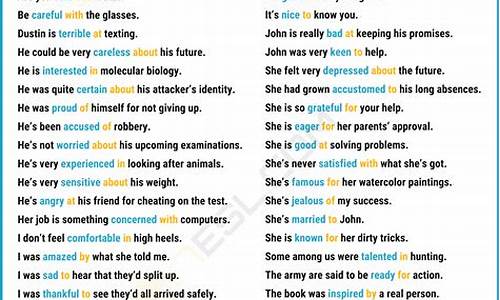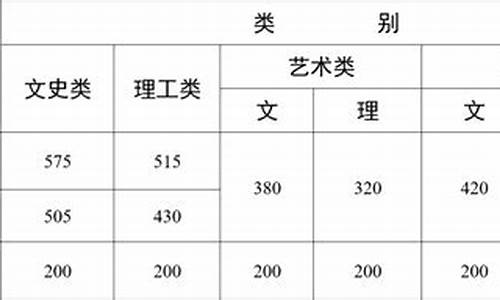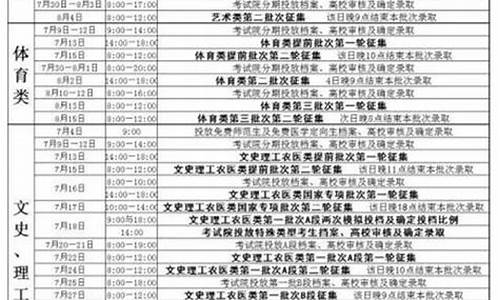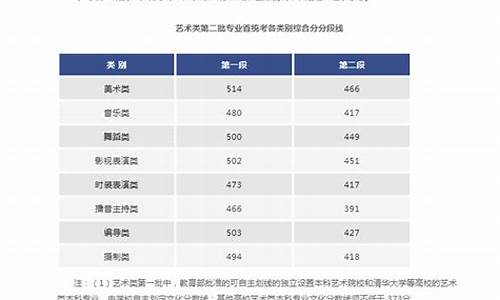高考介词大全_高考介词考点梳理
1.高考英语语法:高中英语语法-英语介词的翻译技巧
2.求江苏英语高考常见的短语,最好是动词+介词的类型。
3.高考英语重点单词用法总结

高考英语语法:省略介词的七种常见情形
1. 介词on的省略
表示星期、日期等的时间的介词on有时可省略:
I’ll arrive (on) Friday. 我将星期五到。
See you (on) June 21st. 6月21日见吧。
2. 介词for的省略
(1) 表示一段时间或距离前的介词有时可省略:
I lived there (for) ten years. 我在那儿住了10年。
They walked (for) fifty miles. 他们走了50英里。
但在否定句中或用于句首时,介词for通常不能省略:
For ten years he lived here. 他在这里住过10年。
We he not heard from him for a long time. 我们很久没收到他的来信了。
另外,若所修饰的动词不是在整个时间范围内都自始自终延续,则for也不省略:
I taught her for three years. 我教过她三年。(其中的for不能省略)
(2) 某些结构中表示原因的介词for有时可以省略:
Pardon me (for) interrupting you. 请原谅我打断你的话。
We quite envy you (for) your success. 我们十分羡慕你的成功。
Please forgive me (for) my fault. 请原谅我的过错。
3. 介词at的省略
what time前的介词at通常可以省略:
What time did he lee here? 他是什么时候离开这儿的?
另外,在“about [around]+时间名词”前的介词at也通常省略:
He arrived (at) about ten o’clock. 他大约(在)10点钟到的。
at home 这一短语中的介词at在美国英语中通常省略:
Let’s stay (at) home this evening. 今晚我们就呆在家里吧。
4. 介词of的省略
all of, both of, half of 用于带限定词(如my, the, these等)的名词前时,其中的介词of通常可以省略:
All (of) the students he passed the exam. 所有的学生都考及格了。
Both (of) my parents are interested in history. 我的父母都对历史感兴趣。
Half (of) the milk had been drunk. 有一半牛奶已被喝了。
注若用于人称代词前,则其中的of不可省略:
All (Both, Half) of us wanted to lee. 我们大家(俩,有一半人)都想走。
5. 介词from的省略
在 prevent [stop]…from doing sth(阻止…发生),se…(from) doing sth(免去…做某事)等结构中的介词from通常可以省略:
The hey rain prevented him (from) coming. 大雨使他不能来。
If I can stop them (from) going there, I’ll do it. 要是我能够阻止他们去那里,我会这样做的。
If you do it tonight, it will se you (from) hing to get up early. 你如果今晚做这事,明天早上你就不必早起了。
注在被动语态中from通常不宜省略。另外,在表示类似含义的prohibit…from doing sth 中的from习惯上不省略,而在与此同义的keep…from doing sth中,from则绝不可省略,否则含义不同:
He kept me from working. 他不让我工作。
He kept me working. 他要我不停地工作。
高考英语语法:高中英语语法-英语介词的翻译技巧
《高中英语语法-高频率介词搭配之三》由出国留学我精心为您学习英语准备.liuxue86。本内容整理时间为05月12日,如有任何问题请联系我们。
高频率介词搭配之三
he trouble we give. 从来没有人抱怨我们带来这么多麻烦。
Carbon dioxide consists of carbon and oxygen. 二氧化碳由碳、氧两种元素组成。
b)动词+sb.+of+sth.。其中of有?剥夺,有关?之意:accuse of控告(谴责,非难)某人, cheat of骗走, deprive of剥夺, inform of汇报, rob of抢走, remind of提醒, warn of警告。例如:
He has cheated me of my poverty. 他骗走了我的财产。
They are deprived of their rights as citizens. 他们的公民权都被剥夺了。
c)动词+sth.+ of +sb.。介词of表动宾关系,后接动作的宾语sb.:request of请求(某人做某事), require of要求得到。例如:
All I request of you is that you should come here early. 我唯一的请求就是希望你早点来。
You he done all the law requires of you. 你做的这一切都是法律对你的要求。
2. be +形容词+ of.
of后接表对象或目标的词,这类短语有很多:be aware of觉察, be ashamed of以?为耻, be afraid of担心, be bare of没有, be careful of小心, be clear of还清债务, be certain of确信, be composed of由?构成, be envious of嫉妒, be forgetful of健忘, be fond of喜欢, be free of免于;摆脱, be full of充满, be guilty of认罪, be hopeful of抱有希望, be informed of汇报, be impatient of对?无耐心, be jealous of嫉妒, be made of用?制成, be mindful of留意, be proud of以?为骄傲, be sick of烦于, be short of缺乏, be sure of确信, be tired of困于, be worthy of值得。
3.of+名词构成的词组:
of age成年, of choice精选的,of course当然, of late最近,of name有名的,of oneself自动地,of purpose有意地,of use有用,of value有价值的。
八、ON
1.动词+on
a)动词+ on.介词on表示?凭借,产生某结果,接通?等意思:act on对?有作用, bring on促使;导致, call on拜访某人, count on依赖, carry on执行, depend on取决, feed on以?为生, figure on料想;推断, go on继续, he on穿着, insist on坚持, keep on继续, lean on依赖, live on以?为生, pull on迅速穿上, put on穿上, switch on接通(电源), take to喜欢;养成;轻易学会,turn on接通(电源), work on操作, wait on侍候。例如:
This kind of medicine acts on the heart. 这种药对心脏有好处。
The fine weather brings on the crops nicely. 好天气促使庄稼长势良好。
We count on you to help. 我们有赖你的帮助。
b)动词+sb.(sth.)+ on +sb.(sth.)。on的意思是?以?,对?,在某方面?:base on以?为基础, congratulate on恭贺, fix on固定, he mercy on怜悯, he pity on怜惜, keep watch on监视, spend on把时间、精力花在某方面。例如:
Theory should be based on practice. 理论联系实际。
Congratulate on your success in the competition. 恭喜你竞赛获得成功。
2.be+形容词+on的词组:
be dependent on依赖, be hard on对某人苛刻, be impressed on对?印象深刻, be keen on渴望, be strict on对?严格。例如:
We can?t just be dependent on our parents. 我们不能只依赖父母。
He is keen on going abroad. 他渴望出国。
3.on+名词构成的词组:
on表示处于某种状态或在某个方位:on board乘(车,飞机), on call听候召唤, on duty值班, on earth到底, on fire着火, on foot步行,on guard在岗,on hire雇用,on holiday度,on lee休,on one?s knees跪下, on one?s way在?的路上,on purpose故意, on sale待售,on shore在岸上, on time准时, on the move行动, on the other hand另一方面, on the spot当场, on the tip of one?s tongue快要说出口, on top of在?的顶部,on watch值班。
九、TO
1.动词+to
a)动词+ to.介词to意为?达到,指向?等:adjust to适应, attend to处理;照料, agree to赞同, amount to加起来达?,belong to属于, come to达到, drink to为?干杯,get to到达, hen to发生在某人身上, hold to紧握, lead to通向, listen to听, occur to想起, object to反对, point to指向, respond to回答, refer to参考;指的是?;涉及, reply to回答, see to负责, stick to坚持, turn to求助, write to给某人写信。
例如:
She must learn to adjust herself to English life. 她必须学会适应英国的生活。
Business has to be attended to. 有事要办。
An idea occurred to me. 我想出一个办法。
b)动词(+sth.)+to+sb.。下列动词不能直接带间接宾语sb.,要接间接宾语时须在动词后加介词to:announce to通知某人, describe to向某人描述, explain to向某人解释, express to对某人表达, mention to提及, nod to向某人点头, report to报告, say to告知, shout to对某人大叫, suggest to对某人提建议, speak to与某人交谈, talk to跟某人谈话, whisper to和某人低声耳语。例如:
She suggested to me one or two suitable people for the committee. 她跟我向委员会推举了一两个合适的人选。
c)动词+sth./sb.+ to +sth./sb.。此时介词to可译成?到,于,给?等意思:add to增加, compare to比作, carry to运送至, devote to致力于, introduce to介绍给, invite to邀请参加, join to连接到, lee to委托给, reduce to下降至, sentence to判处, take to带到。例如:
Please add a piece of candy to coffee. 请给咖啡加块糖。
Poets like to compare life to stage. 诗人喜欢把人生比作舞台。
2. be +形容词/过去分词+ to.
to的意思是?对?:be alive to觉察;晓得, be attentive to注意;留心, be awake to知晓, be blind to缺乏眼光, be close to紧挨着, be common to对某人来说很普通, be contrary to违反;反对, be devoted to致力, be deaf to不愿意听, be equal to有?的力量, be exposed to暴露;遭受, be fair to对?公平, be familiar to对某人来说熟悉, be grateful to对某人心存感激, be good to对?有好处, be harmful to对?有危害, be important to对?重要, be kind to友好对待, be known to周知于, be married to嫁给, be moved to转移到, be near to靠近, be necessary to对?有必要, be opposite to在对面, be opposed to反对, be pleasant to合某人之意, be proper to专属, be polite to礼貌待人, be rude to粗暴对待, be relative to与?有关, be strange to不习惯, be similar to类似, be suitable to适合, be true to忠实, be thankful to感激, be useful to对?有用, be used to习惯。例如:
Are you alive to what is going on? 你注意到发生什么事了吗?
The old man was not equal to the situation. 那老人不能应付这种情况。
His house is opposite to mine. 他的房子在我的房子对面。
3.to+名词构成的词组有:
to a degree在某种程度上, to date到现在为止, to one?s feet跳起来,to one?s mind照?看来, to one 《高中英语语法-高频率介词搭配之三》由出国留学我精心为您学习英语准备.liuxue86
求江苏英语高考常见的短语,最好是动词+介词的类型。
《高中英语语法-英语介词的翻译技巧》由留学liuxue86我整理。本内容整理时间为05月12日,如有任何问题请联系我们。
英语介词的翻译技巧
英语中大多数介词含义灵活,一词多义多用。能够正确的掌握介词的翻译技巧对于我们更好的理解和掌握介词的用法具有很好的帮助作用。除了一些常用短语已有译法外,大量介词需要从其基本意义出发,联系上下文加以灵活处理。下面我们就来简明地介绍几种基本译法。
(一)转译:英语中常用介词来表达动作意义。汉译时,可将介词转译成动词。
①在作表语的介词短语中,介词常转译为动词,而连系动词则省略不译。如:
This machine is out of repair.
这台机器失修了。
②在作目的或原因状语的介词短语中,介词有时转译成动词。如:
The plane crushed out of control.
这架飞机失去控制而坠毁。
③在作条件、方式或方法状语的介词短语中,介词有时转译成动词。如:
But even the larger molecules with several hundred atoms are too small to be seen with the best optical microscope.
但是,即使有几百个原子的分子也是太小了,用最好的光学显微镜也看不见。
④介词短语作补足语时,其中介词常转译成动词。如:
Heat sets these particles in random motion.
热量使这些粒子作随机运动。
(二)增译:增词不是无中生有,而是要根据上下文特别是与介词搭配的动词或形容词的含义加得恰当。有不少情况,句中与介词搭配的动词或形容词不出现,如照原文结构无法把意思表达清楚,甚至易于误解时,这就需要增词。如:
Thats all there is to it.
那就是与此有关的全部内容。(原句中 to=related to)
The engineer was taken ill with consumption.It was flour on the lungs,the doctor told him at the time.
这个工程师得了肺一病、那是由于面粉对肺部的影响,当时医生这样对他说的。
因此,熟悉介词与动词或形容词的习惯搭配是增词并正确理解词义的一种重要手段。
(三)分译:介词短语作定语时,往往是定语从句的一种简略形式。介词短语作状语时,有时是状语从句的简略形式。有些介词短语还是并列句的简略形式。因此汉译时,有的可以拆句分译。
①译成并列分句。
The porous wall acts as a kind of seine for separating molecules.
多孔壁的作用就象一把筛子,它把不同质量的分子分开。
②译成让步分句。
With all its disadvantages this design is considered to be one of the best.
这个设计尽管有种种缺点,仍被认为最佳设计之一。
③译成真实或虚拟条件分句。
Mans warm blood makes it difficult for him to live long in the sea without some kind warmth.
人的血液是热的,如果得不到一定的热量,人就难以长期在海水中生活。
④译成原因分句。
We cannot see it clearly for the fog.
由于有雾,我们看不清它。
The machine is working none the worse for its long service.
这部机器并不因使用的时间长而性能变差了。
⑤译成目的分句。
This body of knowledge is customarily divided for convenience of study into the classifications: mechanics, heat,light,electricity and sound..
为了便于研究起见,通常将这门学科分为力学、热学、光学、电学和声学。
(四)不译:不译或省略翻译是在确切表达原文内容的前提下使译文简练,合乎汉语规范,决不是任意省略某些介词。
①表示时间或地点的英语介词,译成汉语如出现在句首,大都不译。如:
There are four seasons in a year.
一年有四季。
②有些介词如for(为了),from(从?),to(对?),on(在?时)等,可以不译。如:
The air was removed from between the two pipes.
两根管子之间的空气已经抽出。
Answers to questions 2 and 3 may be oained in the laboratory.
问题2和3的答案可以在实验室里得到。
③表示与主语有关的某一方面、范围或内容的介词有时不译,可把介词的宾语译成汉语主语。如:
Something has gone wrong with the engine.
这台发动机出了毛病。
Gold is similar in color to brass.
金子的颜色和黄铜相似。
④不少of介词短语在句中作定语。其中of(?的)往往不译。如:
The change of electrical energy into mechanical energy is done in motors.
电能变为机械能是通过电动机实现的。
Some of the properties of cathode rays listed below.
现将阴极射线的一些特性开列如下。
(五)反译:在不少情况下,有的介词短语如不从反面着笔,译文就不通,这时必须反译。如:
①beyond,past,against等表示超过某限度的能力时,短语有时用反译法。如:
It is post repair.
这东西无法修补了。
There are some arguments against the possibility of life on this planet.
有些论据不同意这行星上可能有生物。
②off,from等表示地点,距离时,有时有反译法。如:
The boat sank off the coast.
这只船在离海岸不远处沉没了。
③but,except,besides等表示除去、除外时,有时用反译法。如:
Copper is the best conductor but silver.
铜是仅次于银的最优导体。
The mdelecular formula,C6H14,does not show anything except the total number of carbon and hydrogen atoms.
分子式C6H14只用来表示碳原子和氢原子的总数。
④from,in等介词短语作补足语时,有时用反译法。如:
An iron case will keep the Earths magnetic field away from the compass.
铁箱能使地球磁场影响不了指南针。
The signal was shown about the machine being order.
信号表明机器设有毛病。 《高中英语语法-英语介词的翻译技巧》由留学liuxue86我整理
高考英语重点单词用法总结
您好,希望对你有帮助。
高考常用动词短语归纳:
look 的常用短语:look up … in查找
look sb. up and down 上下打量
look back to/ upon回顾
look upon…as把… 看作
look forward to期待
look through浏览; 看穿
take a new look呈现新面貌
fear的常用短语:in fear害怕地
(be) in fear of 害怕
for fear of/ that担心;生怕
concentrate 的常用短语:concentrate on 专心…
concentrate one’s mind on 专心于…
类似的短语:
fix one’s mind upon
focus on
put one’s heart into
focus one’s mind on
surprise常用短语:in surprise惊讶地
to one’s surprise 使某人惊讶的是
be surprise at/to do/that
对某事感到惊讶
表示“穿衣”的动作或状态的词和短语1.表示动作的有:
pull on
put on
dress
dress sb
2. 表示状态的有:
wear
be in
be dressed in
he … on
常见表“喜欢”的短语和单词like
care for
be keen on
be fond of
take delight in…
trouble的常用短语:he much trouble / no trouble (in) doing 在…有/没有困难
take great trouble to do
不辞辛劳做某事
put sb to the trouble of doing …
为难某人做某事
make trouble捣乱
be in (great) trouble
惹麻烦;处在困境中
help sb. out of trouble
帮某人摆脱困境
end的常用短语:come to an end……结束
put an end to 结束……
on end竖起, 连续
in the end终于; 最后
end up (by) doing…以……结束
make both ends meet收支相抵
表示“导致”、“由…引起”的短语:1. 导致
cause sth. (to do)
result in
lead to
2. 由……引起
be caused by
result from
grow out of
lie in
表“全力以赴”的短语:do / try one’s best
spare no efforts to do
take great pains to do
go all out to do
do what somebody can (do) to do
do all somebody can (do) to do
direction常用短语:in (the ) direction of….朝……方向
under the direction of ...在……的指导下
follow the directions照说明去做
far常用短语:far from (being)离……要求相差很远
far from +(a place)距离某地很远
far away遥远
so far 到目前为止; 那么远
as far as sb. knows/sees据某人所知
by far
(最高级前,比较级后)起强调作用
distance常用短语:in the distance在远处
from/ at a distance从远处
keep sb. at a distance
于某人保持一定距离
It is no distance at all.不远
use常用短语:used to do过去曾经、常做
be used to doing …习惯于……
be used to do被用来做……
make good/ full use of充分利用……
come into use开始使用……
it is no use doing …干……没有用
“出了什么事”的几种不同表达What’s wrong with….?
What’s the matter with…?
What’s the trouble with…?
What hened (to sb.) ?
“众所周知”常用表达法:It is known to all that…主语从句,that不能省
As is known to all,定语从句,置于句首
We all know (that)后接宾语从句
Everyone knows (that)后接宾语从句
, which is known to all.非限定从句,置于句末
表“同意某人意见”的常用短语:agree with sb. /what sb. said
agree to sth.
rove (of) sth.
in four of sth.
be agreeable to sth.
be for sth.
“不同意”
disagree with sb./ what sb. said
object to sth.
disrove (of) sth.
be against sth.
sign的常用短语:sign one’s name签名
sign to sb (not) to do sth.
示意某人(不)做某事
signs of …
……的迹象
would rather 与 prefer 的区别1.宁愿做……而不做……
would rather do A than do B
prefer A to B
prefer to do A rather than do B
2. would rather 主语 + 过去式,表示“宁愿”
eg. I would rather you came tomorrow than today.
should prefer sb. to do sth./ should prefer 主语 + 过去式,表示“比较喜欢……”
eg. I should prefer you not to go there alone.
OR: I should prefer that you did not go there alone.
trap常用短语be caught in a trap落入圈套
be led into a trap中圈套
set a trap to do sth.设圈套……
be tred in sth.被…..所围困
grow常用短语in the grow of在….成长中
grow up长大; 成长
grow rich on靠….. 变富
grow into长成……
grow out of由…..引起/滋生出
make常用短语be made up of =consist of 由……组成
make up for弥补
be made from/ of由……造成
make up编造;组成;化妆
be made into制成……
make fun of取笑; 嘲弄
make a living 谋生
supply, provide, offer 的区别:
1.表示“向某人提供某物”
supply / provide sb. with sth.
supply / provide sth. for sb.
supply sth. to sb.
offer sb. sth.
2. 表示“主动提出做某事”
offer to do sth.
3. 表示“倘使”、“如”
provided / providing that
= on condition that
=only if
4. 表示“满足需要”supply / meet a need.
supply的常用短语in short supply 缺乏,不足
medical/military supply医疗/军用品
supplies of…许多
lack的常用短语be lacking in sth. 在……不足
make up for the lack of
弥补……的不足
for/by/from/through lack of…
由于…不足,缺乏
he no lack of不缺
damage的常用短语do damage/harm to 对……有害
cause damage to 对……造成损害
ask for damage要求赔偿
die of 与die from 的区别
die of 表示“死于……病”或冻死、气死,或死于过度悲伤。
die of cancer/grief/hunger/anger/cold
die from表示死于外伤、事故、劳累过度。如:
die from polluted air/overwork/sword thrust
die常用短语die for one’s country为国捐躯
die down熄灭、平息
die off绝种、枯死
die away消逝、静下来
die a heroic death英勇牺牲
threaten常用短语threaten sb. with sth.用……威胁某人
threaten to do…威胁做……
under the threat of…在……的威胁下
speed常用短语speed up加速
at the speed of…以…..的速度
with great speed迅速
aim常用短语take aim at瞄准
reach an aim达到目的
aim at瞄准、针对
permit与allow 的区别
表“允许做某事”或“允许某人做某事”用法基本相同。
permit/allow doing sth.
permit/allow sb. to do sth.
permit /allow of sth
一般在独立主格结构中表示“时间、条件等许可”,多用permit
Time/Weather permitting, I’ll drop in on her.
allow 还可以表示“承认”、“考虑到”。例如:
1. We allow him to be wronged.
2. will take an hour to go there, allowing for traffic delays.
means常用短语by means of通过….., 靠……
by this means/ in this way用这种方法
by no means/in no case决不
by all means用一切办法
keep常用短语keep up with紧跟…..
keep sb. doing sth.让某人一直做
keep sb. from doing sth.阻止…..做……
keep off the grass勿踏草地
keep to the point紧扣主题
keep in touch with与……保持联系
mark常用短语make one’s mark成功、出名
be marked with标明
gain/get full marks for ……得满分
seat常用短语take one’s seat坐下
he a seat请坐
see/find sb. seated看见/发现某人坐在….
be seated就座, 坐着
seat oneself in/at/on使自己坐在……
部分 动词+ to + doing 的用法
look forward to
get down to
object to
devote… to…
pay attention to
prefer…to…
give常用短语give up放弃
give in让步\屈服
give off 散发出
give away赠送、泄漏
give rise to 引起……
give out 疲劳、用完、散发出
fit常用短语be fit for适合
keep fit/keep healthy保持健康
be fit to do 适合于…..
fit in with适应……
a nice fit合身的衣服
…fit sb.某人穿….. 合身
reach 常用短语reach an agreement达成协议
reach for…伸手去拿/够……
within / out of reach够得到/够不着
reach sb’s understanding 使某人明白
feed常用短语feed sth. to sb/feed sb. on sth. 用……喂养……
be fed up of…/ be tired of…/ be bored with…
对……感到厌倦
feed on以……为食
mercy常用短语without mercy残忍地
he mercy on /upon 对……表示怜悯
at the mercy of任凭摆布
beg for mercy 乞求饶恕
exist常用短语exist in/lie in/consist in存在于……
in existence 现存的
come into existence/ come into being 形成
opinion常用短语in one’s opinion =in the opinion of sb.在某人看来
he a high/ low opinion of
对……评价高/低
give one’s opinion on
对……谈自己的看法
persuade常用短语persuade sb. to do =
persuade sb. into doing
说服某人做某事
try to persuade sb. to do
试图说服某人做某事
persuade sb. to sth.
说服某人同意某事
engage 常用短语be engaged to sb.
与某人订婚
be engaged in sth. =
be engaged doing sth.
忙于……, 从事某事
wide 与broad 的区别
它们均可以表“宽”和“广阔的”
a river 50 feet wide/ broad
指身体部位“宽肩、宽背”一般用broad, 表示
“睁大眼睛、张大嘴巴”一般用wide。
broad shoulders/ back
with wide eyes
open one’s mouth wide
wide 还可以作副词,表示“完全、大大地”
be wide awake
be wide open
sure常用短语be sure of/about
对……由把握
be sure to do sth.
肯定会……
make sure + that-clause
务必……,一定要……
make sure of…
弄清楚……
experience 常用短语he experience in…
在……有经验
be experienced in…
在……有经验
pain 常用短语take great pains to do
努力做某事
spare no pains to do
全力以赴做某事
stick 常用短语stick to sth.
坚持……
stick …on…
粘贴……
be stuck in …
陷进……
stick no bills
请勿张贴
spare 常用短语spare money/time for
省出钱…,腾出时间
in one’s spare time
在某人业余时间
spare no efforts to do
不遗余力去做
don’t spare the opinions
不要保留意见
put down的不同含义put down (one’s knife and fork) 放下……
pit down the rebellion
镇压
put down what sb. says
记下,写下
take up 的不同含义take up a hobby
培养……
take up football
开始……
take up the work
继续……
take up…time/space
消耗,占据……
take up a post
就职
take up a song/ cry
跟着一起……
habit 常用短语form/get the habit of
养成……习惯
be in/he the habit of
有…….习惯
get into the habit of
沾染了……恶习
get rid of the habit=
grow out of the habit=
break away from the habit
改掉了……习惯
高考的单词量是3000个,繁多且难以记忆。把重点的单词 总结 归纳起来,是不是容易多了?下面由我给你带来关于高考英语重点单词用法总结,希望对你有帮助!
高考英语重点单词用法总结1
1.able 用法:be able to do
Note: 反义词 unable表示不能,而disabled表示残疾的。
be able to do可以表示经过艰难困苦才能做到的事。
2.abroad 用法:表示到(在)国外,是一个副词,前面不加介词。
Note: 可以说from abroad, 表示从国外回来。
3.admit 用法:表示承认的时候后面要加上动名词形式。
Note: 表示允许进入的时候与介词to搭配。
4.advise 用法:advise sb. to do; advise doing
Note: 后面的宾语从句要用虚拟语气。即:advise that sb. (should) do的形式。
5.afford 用法:通常与动词不定式搭配使用。
Note: 前面需要有be able to或can等词。
6.after 用法:表示在时间、空间之后;be after表示追寻。
Note: 用在将来时的时候后面接一时间点,而in接一个时间段,如:after 3 o?clock; in 3 days.
7.agree 用法:与介词on, to, with及动词不定式搭配。
Note: agree on表示达成一致;agree to表示批准;agree with表示同意某人说的话。
8.alive 用法:表语性形容词,在句中只能作表语,不能作定语。
Note: 可以作状语使用,表示活活地,如:bury sb. alive.
9.allow 用法:allow doing; allow sb. to do
Note: 可以表示允许进入,如:Please allow me in.
10.among 用法:用在三者或三者以上的群体中。
Note: 还可以表示其中之一,如:He is among the best.
11.and 用法:用于连接两个词、 短语 、 句子 或其他相同结构。
Note: 与祈使句搭配时往往可以表示条件。如:Work hard, and you?ll succeed sooner or later.
12.another 用法:表示又一个,泛指,相当于one more的含义。
Note: 不能直接加复数名词,需要与一个数词搭配,如:another 2 weeks.
13.answer 用法:及物动词,但在作名词时要与介词to搭配。
Note: 可以表示接电话、应门等。如:answer the phone/door.
14.anxious 用法:be anxious for/about/to do
Note: be anxious about表示担心;be anxious for表示盼望得到。
15.ear 用法:不及物动词,没有宾语,没有被动语态。
Note: 还可以作为系动词,与seem同义,表示看起来?。
16.arrive 用法:arrive at表示到一个小地方;arrive in表示到一个大地方。
Note: 引申含义表示得出,如:arrive at a decision/conclusion.
17.ask 用法:ask to do; ask sb. to do; ask for
Note: 后面的宾语从句要用虚拟语气。即:ask that sb. (should) do的形式。
18.asleep 用法:表语性形容词,在句中只能作表语,不能作定语。
Note: 通常与动词be及fall搭配;sound asleep表示熟睡。
19.attend 用法:表示参加,后面经常加上meeting, lecture, conference, class, school, wedding, funeral等词;也可以表示照顾,照料。
Note: attend to可以表示处理、照料等。
20.attention 用法:pay attention to; draw/catch sb?s attention
Note: 写通知时的常用语:May I he your attention, please?
21.beat 用法:表示打败某人,或连续不断地击打某物。
Note: heartbeat表示心跳。
22.because 用法:后面接原因状语从句,because of后面接名词。
Note: because表示直接原因,因此只有用它才可以回答why的特殊疑问句及用在强调句中。
23.become 用法:系动词,表示变得?。可以由好变坏或由坏变好。
Note: become of sb.表示某人发生了什么事情。
24.before 用法:before long, long before, the day before yesterday, the week / year before last 上上周/前年
Note: It be + 段时间 before?在该句型中,主句时态只有将来时态和一般过去时态。
25.begin 用法:begin to do; begin doing
Note: 当begin本身是进行时的时候,只能用begin to do的形式。如:It was beginning to rain.
高考英语重点单词用法总结2
26.believe 用法:believe sb.表示相信某人说的话;believe in sb.表示信任;6123结构。
Note: 回答问句时通常用I believe so/not的形式。
27.besides 用法:表示除?之外还有,包含在一个整体之中。
Note: 还可以用作副词,表示此外,要用逗号隔开。
28.beyond 用法:表示越过、在另一边,如:beyond the wood/bridge.
Note: 可以用于引申含义,表示超出?,如:beyond control/power/description.
29.bit 用法:与a little一样可以修饰不可数名词,形容词或副词。
Note: 修饰名词时要用a bit of;not a bit表示一点也不。
30.blame 用法:take/bear the blame; blame sth. on. sb.
Note: 表示应受到责怪时不用被动语态,如:He is to blame.
31.blow 用法:blow down/away
Note: 表示风刮得很大时要用blow hard.
32.boil 用法:boiling表示沸腾的;boiled表示煮过的。
Note: boiling point可以表示沸点。
33.borrow 用法:borrow表示借入:lend表示借出。
Note: 点动词,不能表示借的时间长短。
34.breath 用法:hold one?s breath;out of breath; se one?s breath
Note: take a breath表示深吸一口气;take breath表示喘口气。
35.burn 用法:burn down/up/one?s hand
Note: burning表示点着的;burnt表示烧坏的。
36.business 用法:on business表示出差;in/out of business表示开/关张。
Note: 表示商业时不可数,表示具体的行业时可数。
37.busy 用法:be busy with/doing.
Note: 不能说My work is busy. 应说I am busy with my work.
38.buy 用法:buy sth. for 5 dollars; buy sth. for sb.
Note: 点动词,不能表示买的时间长短。
39.but 用法:not?but.. but for next but one , he no choice bu to do sth., all but 几乎,差一点
Note: do nothing but do sth. nothing前有do,后面的to要省略。Not only? but also?引导的并列句,前倒后不倒。cannot help/ choose but do sth. 不能不,只能
40.by 用法:by accident, by air/ sea/ train, by and by, by far, by force, by mistake, by chance, by the way
Note: by way of 取道,经由。by reason of 由于。by 引导的时间状语一般句子用完成时态。
41.care 用法:take care of; with care; care for/about
Note: care about表示在乎,常用于否定句;care for表示关心,喜爱,常用于肯定句。
42.carry 用法:carry表示搬运;carry on表示进行;坚持下去;carry out表示执行。
Note: carry没有方向性,可以表示随身携带。
43.case 用法:in case; in case of; in any case; in this/that case
Note: in case后面的状语从句可以用虚拟语气,即in case sb. should do的形式。
44.catch 用法:catch the thief; catch fire; catch a cold; catch up with
Note: be caught表示陷入困境,如:He was caught in the rain.
45.cattle 用法:集合名词,动词要用复数形式。如:Cattle are raised here.
Note: 一头牛可以用a head of cattle. 注意十头牛用ten head of cattle。
46.chance 用法:by chance; take a chance; there is a chance that?
Note: 在chance后面可以用动词不定式或者of的结构作定语。
47.change 用法:change A for B表示用A换成B;change A into B 表示把A变成B。
Note: 表示变化时是可数名词,表示零钱时不可数。
48.class 用法:集合名词,谓语动词单复数由其表示的意思决定。
Note: in class表示在上课,in the class表示在班上。
49.close 用法:动词表示关闭;形容词表示亲密的;副词表示靠近。
Note: close作副词时表示距离上的靠近,而另一个副词形式closely表示密切地。
50.clothes 用法:复数名词,谓语动词用复数,不能加不定冠词。
Note: 要用few或many来修饰。
高考英语重点单词用法总结3
51. buy 用法:buy sth. for 5 dollars; buy sth. for sb.
Note: 点动词,不能表示买的时间长短。
52. but 用法:not?but.. but for next but one , he no choice bu to do sth., all but 几乎,差一点
Note: do nothing but do sth. nothing前有do,后面的to要省略。Not only? but also?引导的并列句,前倒后不倒。cannot help/ choose but do sth. 不能不,只能
53. by 用法:by accident, by air/ sea/ train, by and by, by far, by force, by mistake, by chance, by the way
Note: by way of 取道,经由。by reason of 由于。by 引导的时间状语一般句子用完成时态。
54. call 用法: call for / up / back / in / , call on sb. to do sth., pay / make a call on sb. give sb. a call ,on call
Note: call at后面跟地点;call on 后面跟人。
55. care 用法:take care of; with care; care for/about
Note: care about表示在乎,常用于否定句;care for表示关心,喜爱,常用于肯定句。
56. carry 用法:carry表示搬运;carry on表示进行;坚持下去;carry out表示执行。
Note: carry没有方向性,可以表示随身携带。
57. case 用法:in case; in case of; in any case; in this/that case
Note: in case后面的状语从句可以用虚拟语气,即in case sb. should do的形式。
58. catch 用法:catch the thief; catch fire; catch a cold; catch up with, catch sb. doing sth.
Note: be caught表示陷入困境,如:He was caught in the rain.
59. cattle 用法:集合名词,动词要用复数形式。如:Cattle are raised here.
Note: 一头牛可以用a head of cattle. 注意十头牛用ten head of cattle。
60. chance 用法:by chance; take a chance; there is a chance that?
Note: 在chance后面可以用动词不定式或者of的结构作定语。
61. change 用法:change A for B表示用A换成B;change A into B 表示把A变成B。
Note: 表示变化时是可数名词,表示零钱时不可数。
62. charge用法:charge sb. with (doing) sth. that? , charge sb. to do sth. charge sb. for $
Note: in charge of 负责; in the charge of 由某人负责(表示的是被动的)。
63. class 用法:集合名词,谓语动词单复数由其表示的意思决定。
Note: in class表示在上课,in the class表示在班上。
64. clear用法:clear away, clear off, make clear, it is clear that?
Note: clear up 及物时表示?澄清,整理,收拾?;不及物表示?晴朗起来,开朗起来?。
65. close 用法:动词表示关闭;形容词表示亲密的;副词表示靠近。
Note: close作副词时表示距离上的靠近,而另一个副词形式closely表示密切地。
66. clothes 用法:复数名词,谓语动词用复数,不能加不定冠词。
Note: 要用few或many来修饰。
67. collect 用法:collect stamps; collect one?s child from school
Note: a collect phone表示对方付费的电话。
68. come 用法:表示到说话者所处的地方来。常见短语有:come to, come about, come across, come out,come to an end, come down, come up, come into being/ exist / force / effect等。
Note: 可用作系动词,表示变成,如:His dreams came true.
69. common 用法:表示普遍性,如:Smith is a common name.
Note: common sense表示常识;in common表示共同点。
70. compare 用法:compare?with?表示把?与?作比较;compare?to?表示把?比作?。
Note: 用作状语时,二者都可以表示比较,如:Compared with/to other women, she was very lucky.
71. consider用法:consider doing sth. / what to do / that...,consider sb. sth. 6123结构
Note: 该词直接跟宾语用动名词但可以用不定式作宾补;considering引导短语作状语,表示?考虑到?
72. condition 用法:表示生活、工作等的条件或状况。
Note: on condition that表示只要,条件状语从句。
73. content 用法:be content with/to do
Note: 表语性形容词,在句中只能作表语,不能作定语。
74. cost 用法:sth. cost sb. some money,只能用物作主语。
Note: 修饰cost要用副词high或low.
75. cover 用法:be covered with表示状态;be covered by表示动作。
Note: 反义词uncover表示揭开盖子;discover表示发现。
高考英语重点单词用法总结4
76. cross用法:cross off 划掉,cross one?s mind, cross out, bear one?s cross 忍受痛苦
Note: 作形容词一般用于be cross with sb. = be angry with sb.
77. crowd 用法:be crowded with
Note: 集合名词,谓语动词单复数由其表示的意思决定。
78. cure 用法:cure sb. of ?
Note: cure 强调治愈,表示结果;而treat知表示动作。
79. cut 用法:cut down/up/off
Note: 作名词时a short cut表示捷径。
80. damage 用法:do damage to sb. = do sb. harm
Note: 表示损害的时候不可数,复数形式可以表示赔偿费。
81. danger 用法:in danger表示处于危险的境地。
Note: 表示一般概念时不可数,表示具体危险时可数。
82. dare用法:作为情态动词一般用于否定句,疑问句或者条件状语从句;作为实意动词后跟不定式。
Note: I dare say that?.意为:我猜测,可能,或许。
83. dark 用法:before/after dark; in the dark
Note: 可以表示深色的,如:dark blue.
84. deal 用法:a great/good deal of修饰不可数名词。
Note: 作动词时构成短语deal with, 常与副词how搭配。
85. defeat用法:及物动词,后面的宾语是国家,队,军队等名词。
Note: 不能用人作宾语。
86. demand 用法:demand to do; demand that?, demand of sb. to do sth.
Note: 后面的宾语从句要用虚拟语气。即:demand that sb. (should) do的形式。
87. depend用法:depend on sb./ sth. / one?s doing sth. / to do sth.
Note: depend 不及物动词,常和on连用。意为?依靠,信赖?
88. desert 用法:名词表示沙漠;动词表示抛弃。
Note: 可以用过去分词作表语或定语,表示废弃的,如:a deserted house.
89. determine 用法:determine to do; determine sb. to do
Note: 过去分词表示有决心的,可以说be determined to do sth. 决心做?(表示状态)
90. devote 用法:devote oneself to; be devoted to
Note: 与devote搭配的to是介词,后面接名词或动名词。如:His whole life was devoted to teaching.
91. die 用法:die of/from/for/out/ away
Note: 点动词,不与for引起的时间状语连用。
92. difficulty 用法:he difficulty with; he difficulties with sth. ; he difficulty in doing sth. ;
Note: 表示一般概念时不可数,表示具体困难时可数。
93. disagree 用法:disagree with sb.
Note: disagree虽然在形式上有否定前缀,但并不是个否定词。注意它的反义问句形式:He disagreed with you, didn?t he?
94. distance 用法:in the distance; at a distance
Note: 可用于引申含义,表示时间上或情感上的距离。
95. divide 用法:divide?into?表示把?分成几份。强调分成等份。
Note: 可以表示除法,如:Nine divided by three is three.
96. do 用法:do away with, do sb. a faour; do up; do with., do wonders, do sb. wrong = do wrong to sb.
Note: 主要用作及物动词;不及物时表示?行?:If you he no pen, pencil will do.
. dou用法:dou sb. / sth. , beyond dou, in dou, no dou, without a dou
Note: 主句是否定句时宾语用that引导;主句是肯定句时宾语用whether / if引导。
98. downtown 用法:副词,前面不加介词,如:go downtown.
Note: 可用作定语,如:a downtown street.
99. draw 用法:draw a picture/the curtain
Note: 引申含义表示得出,如:draw a conclusion/lesson.
100. dream 用法:dream of/about/that?
声明:本站所有文章资源内容,如无特殊说明或标注,均为采集网络资源。如若本站内容侵犯了原著者的合法权益,可联系本站删除。












